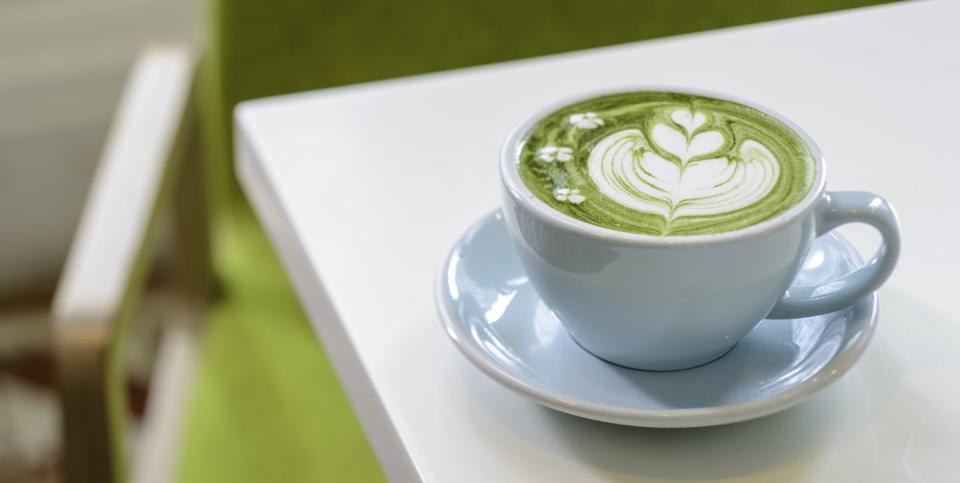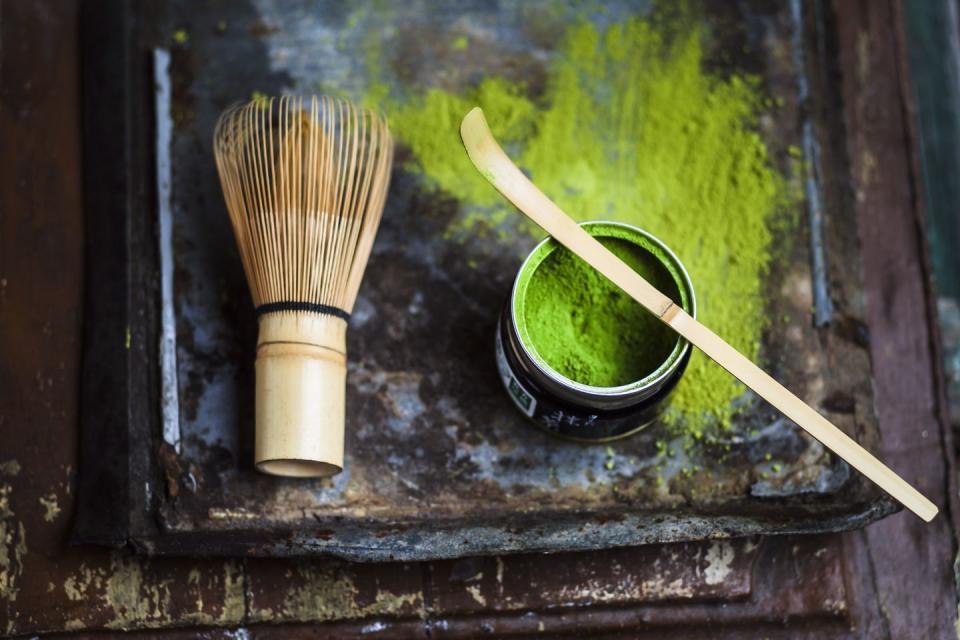8 health benefits of drinking matcha tea

With its zingy lime green colouring and distinctive grassy flavour, matcha isn't your average cup of char. You've probably spotted this new addition on the latte board of your local coffee shop, or seen matcha powder blitzed into a smoothie on Instagram.
Aside from the eye-popping colour, the next thing you'll likely notice about matcha is the price. A cup-full of this potent green powder certainly doesn't come cheap. So, what exactly is matcha, is any healthier than regular old green tea, and should you be drinking it?
To find out more, we asked registered nutritionist Jenna Hope to reveal what matcha's made of, explain what it tastes like, and share tips on safe consumption:
What is matcha?
Matcha is a finely-ground powder made from green tea leaves that have been grown, harvested and processed in a specific way. The leaves used to make matcha are grown under shade for a period of time before harvesting, says Hope, which increases levels of chlorophyll (the healthful green pigment found in plants) and L-theanine (a non-protein amino acid linked to mental relaxation).
After spending three or four weeks growing in the shade, the stems and veins of the plant – Camellia sinensis – are removed, and the leaves are ground down. 'Matcha is often either stone-milled or metal-milled,' she continues. 'Stone-milled tends to have a softer flavour, whereas metal-milled matcha is often sharper in taste.'
Matcha is central to the Japanese tea ceremony, a cultural and spiritual activity that involves the ceremonial preparation and presentation of matcha, and has been grown in Japan for centuries. There are two distinct types of matcha: the higher-quality 'ceremonial grade', which can be used in the ceremony, and lower-quality 'culinary grade', which indicates it's best for flavouring foods.
What does matcha taste like?
'Matcha has an earthy, umami flavour – although, naturally it'll taste different to everyone,' says Hope. 'Iced matcha is sweeter than warm matcha as the ice increases the release of the natural sugars. Therefore, trying matcha over ice is a great way to introduce someone to the taste of matcha.'
Since it's a fine powder, matcha is prepared and consumed differently to tea leaves and tea bags – it's whisked into liquid, rather than being infused. 'Traditionally, it's served short with water, and shouldn't be heated above 80°C,' Hope says. 'Alternatively, it can be served as a latte with milk or a milk alternative.'
These days, however, you'll find matcha in just about anything – pancakes, madeleines and even ice lollies. 'Due to its rise in popularity, individuals have started baking with it by adding it to cakes and cookies, although these high temperatures can degrade the beneficial plant compounds,' Hope says.
Is matcha healthier than green tea?
Matcha and green tea share the same health benefits – but they're more concentrated in matcha. Mostly since you're consuming the powdered whole leaf, rather than liquid from strained leaves, but also because matcha contains greater quantities of certain antioxidants and healthful compounds due to the growing and harvesting process.
The most prominent antioxidant is epigallocatechin gallate (EGCG), a potent catechin that has some impressive scientific research behind it. 'Evidence suggests matcha contains far more ECGC than regular green tea leaves,' says Hope. 'EGCG is an antioxidant which helps to reduce free radicals in the body. Excess free radicals contribute to cell damage and cell death.'

Matcha also contains more caffeine and L-theanine than green tea. 'The caffeine content of matcha varies depending on the age of the tea, method and storage, but can range between 50mg to 100mg per cup,' says Hope. Interestingly, L-theanine modifies the effects of caffeine in your body. It also boosts levels of soothing brain chemicals and dampens those linked to stress and anxiety.
'L-theanine causes a slower release of caffeine and increases the release of the neurotransmitter GABA,' says Hope. 'GABA plays a key role in exerting a calming effect, and therefore the slow release of the caffeine causes a gradual rise and slow fall – rather than the sharp spike and crash that may be experienced from coffee consumption.'
To get the most out of your morning cup, drink it on an empty stomach. Your body doesn't absorb EGCG as effectively when in combination with food, researchers from Australia found.
8 health benefits of matcha tea
While human studies specific to matcha are limited, the potent plant compounds locked inside its leaves have been associated with a wide variety of health benefits – from reducing anxiety to supporting your immune system – as you'll discover below.
1. Matcha can reduce anxiety
Drinking matcha tea can reduce anxiety, a rodent study by Kumamoto University concluded. The reason? Plant compounds in the matcha activate dopamine (D1) and serotonin (5-HT) receptors, which are closely related to anxious behaviour.
2. Matcha boosts fat-burning
Matcha can change the type of fuel your body uses during exercise – it helps you burn fewer carbohydrates and more fat during moderate-intensity physical activity, a human study by sports scientists at the University of Chichester revealed.
3. Matcha may protect liver and kidneys
When scientists at the University of Toyama gave diabetic rats matcha for 16 weeks, it prevented damage to their kidneys and liver. However, consuming too much matcha may actually cause symptoms of liver or kidney toxicity – so enjoy the drink in moderation.
4. Matcha enhances brain function
The EGCG in matcha enhances learning and memory, rodent-based research published in Molecular Nutrition & Food Research concluded. It boosts the production of neuron cells – a process known as neurogenesis – in the brain's hippocampus, which processes information from short-term to long-term memory.
5. Matcha supports your immune system
Another win for the EGCG in matcha. In a rodent study by Oregon State University, the antioxidant 'significantly increased the numbers and frequencies' of regulatory T-cells, which play a vital role in immune system function.
6. Matcha's compounds kill cancer cells
Again, all thanks down to the EGCG in matcha, which has proven and powerful anti-cancer properties. Test tube studies have found that EGCG helps to kill off prostate, skin, lung, and liver cancer cells. It's far too early to say how this discovery translates to humans, but a fascinating one nonetheless.
7. Matcha might protect against heart disease
Green tea has been shown to reduce cholesterol levels in human studies, and observational studies suggest regularly drinking the beverage reduces your risk of heart disease and stroke. Since matcha is super-potent green tea, it theoretically harbours the same benefits, but more research is needed.
8. Matcha might help you live longer
Heavy emphasis on the word 'might', here. Ingesting 300mg of EGCG every day (equivalent to around two cups of matcha) could help you live up to 14 per cent longer, according to rodent research from Harbin Medical University. This is because it inhibits the activity of free radicals, which contribute to the ageing process.
Is it safe to drink matcha everyday?
There are some potential side effects associated with over-consuming matcha. 'Matcha is a source of caffeine, which can impair sleep quality and quantity,' says Hope. 'Excess caffeine is not recommended for individuals who are prone to stress and anxiety. Caffeine consumption should be moderated in pregnancy – no more than 200mg per day.'
It's also incredibly potent, and you can definitely have too much of a good thing. A cup of matcha contains about three times more antioxidants than regular green tea. If you're mainlining the stuff, it can cause nausea and even symptoms of liver or kidney toxicity, so go easy – up to two cups a day should be fine for most people.
Finally, take care to read the label of your matcha, and choose a certified organic, ceremonial-grade product wherever you can. Unlike a cup of regular green tea, you're consuming the entire leaf, which may contain pesticides, heavy metals (like lead or arsenic) and other contaminants from the soil that are harmful when ingested in large amounts.
Last updated: 14-04-2021
You Might Also Like

